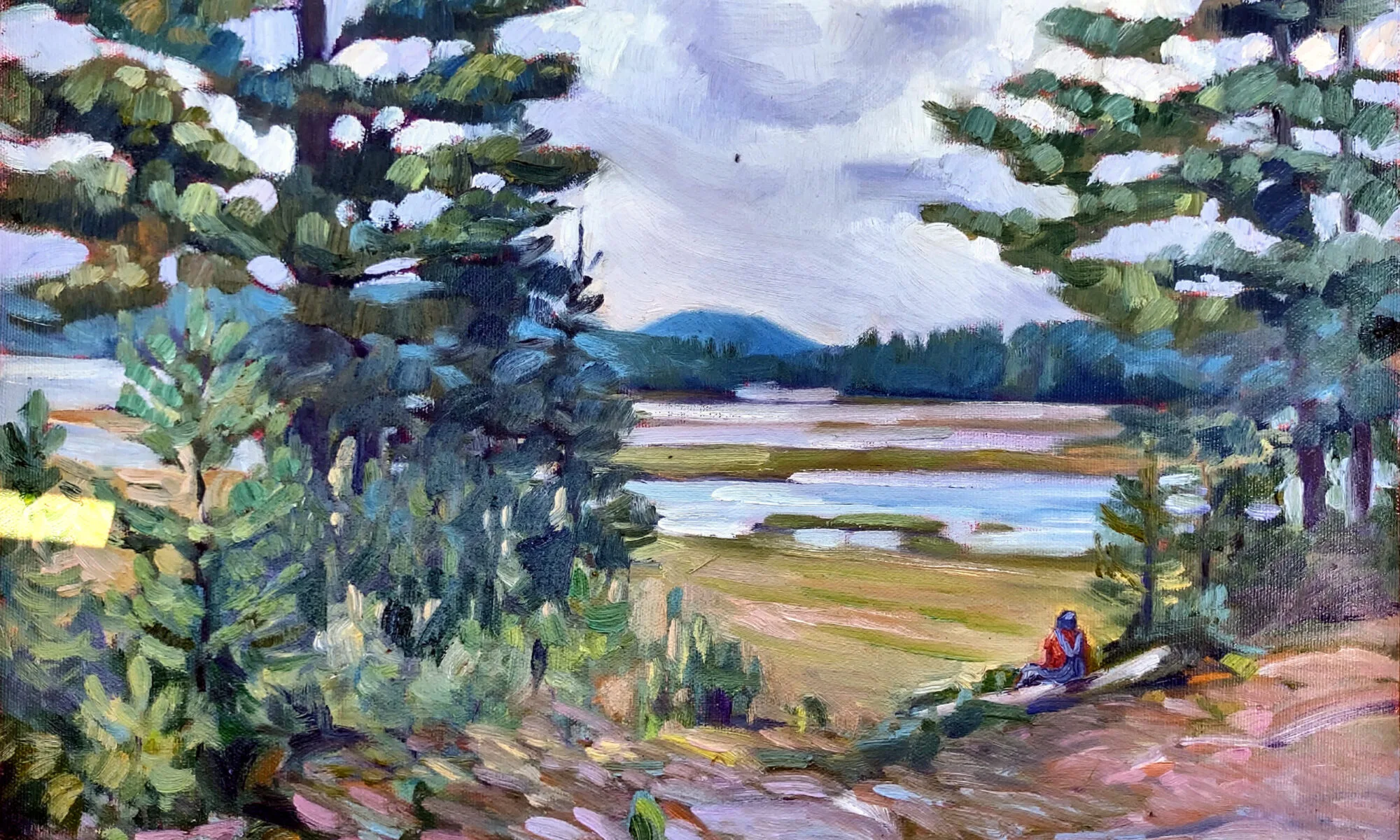Life during the Age of Sail was often “solitary, poor, nasty, brutish, and short.”
 |
| Safety Check, Carol L. Douglas, courtesy Camden Falls Gallery |
I dithered about whether I was going to go sailing this week. My asthma has been kicking up and it seemed unfair to Captain John Foss to have to decide whether to feed me to the fishies.
On Friday night, I went down to the harbor to watch the harvest moon rise. The lobster fleet nodded gently on a whisper of sea air. I found myself able to breathe. If the Captain doesn’t make me do all the work, I should be fine. I’ve got a new inhaler, so off I go.
 |
| Breaking Storm, Carol L. Douglas, courtesy Camden Falls Gallery |
I’ve painted American Eagle many times. She’s got beautiful lines and has been lovingly restored. She’s a youngster compared to much of the Maine schooner fleet, having been built in 1930 in Gloucester, MA. Because she was originally outfitted with an auxiliary engine, she’s an oddity: the sole survivor of the transition between sail and engine in fishing vessels.
She was called Andrew and Rosalie when she was a working fishing boat. Her schooner rig was removed around 1945 and she was converted to a trawler. She must have been an awful mess with no sails, an elevated pilothouse perched on the quarterdeck, winches, booms and reels for trawling on the forward deck. I could drive down the hill and ask the Captain (who was responsible for her restoration) for a picture. I poked around the internet instead. No luck, but I found this sad story, dated January 12, 1937:
| Setting blocks (American Eagle and Heritage), Carol L. Douglas, courtesy Camden Falls Gallery |
“A loose knob on the pilot house door of the local auxiliary sch. Andrew and Rosalie, Capt. George Goodwin, spelled death for Albert ‘Boxie’ Blagdon, 38 years, single, native of Newfoundland, at 6 o’clock this morning on Middle Bank, 12 miles southeast of Eastern point, when Blagdon lost his balance and drowned in the sight of his shipmates. The craft arrived here at 8.30 o’clock this morning, with the flag flying half-mast, to report the affair. Blagdon had no known local relatives, and lived aboard the ship when in port.
“The vessel left here Sunday, single dory trawling, and had secured 10,000 pounds of groundfish on Middle bank, until the breeze that swept the waters this morning prevented the crew of 15 men from fishing. Capt. Goodwin decided to come closer into shore for harbor, and wait for the breeze to die down. He had ordered halfhours tricks at the wheel and Blagdon had just completed his 6 o’clock, being relieved by Edward Armstrong.
| Winch (American Eagle), Carol L. Douglas, courtesy Camden Falls Gallery |
“Armstrong on taking the wheel, asked Blagdon to hook the door. The latter did so, and then took hold of the knob of the door to steady himself as he began to walk down the narrow way between the starboard rail and the house. His foot is believed to have caught on ice on the deck, and as he held more tightly on the knob to keep his feet, the knob pulled out and sent Blagdon hurling over the rail into the icy waters. The last the crew saw of him was his boots disappearing into the ocean. He was weighted down with oilskins, heavy underclothes, and heavy leather boots, which coupled with the temperature of the water, probably prevented him from saving himself from drowning. Capt. Goodwin immediately ordered a dory overboard, but an hour’s search failed to reveal where Blagdon had drowned, or any trace of his body.
“The unfortunate man had been one of the vessel’s crew since the middle of last November and was regarded as an able fisherman and a willing worker. He had followed the sea from his childhood, and came here as a young man to sail out of Gloucester. The sch. Andrew and Rosalie will leave port again tonight to complete her fishing trip.”
 |
| American Eagle in Drydock, Carol L. Douglas, courtesy Camden Falls Gallery |
I can sometimes get nostalgic for the Age of Sail, but stories like that remind me that, as with so many other things from our past, the life of a fisherman was often “solitary, poor, nasty, brutish, and short.”
If I fall in, the Captain will probably retrieve me. To do otherwise would result in a mess of paperwork. Either way, my blog goes dark this week. I don’t do that often, but phone service is dicey on Penobscot Bay.
I’ll see you on Friday.
